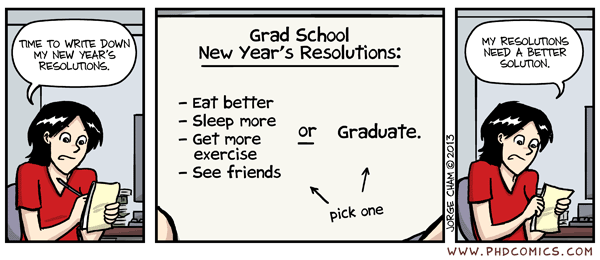 PhD Comics’ comic strips are so effective because they capture much of the essence of postgraduate life: long hours, obsession, frequent criticism, self-doubt, angst and despair. When I was studying for my undergraduate degree in the early 2000s these aspects of academic life tipped me into a nasty bout of clinical depression. Sadly I didn’t realise at the time that it was these academic work-life balance, resilience and cultural issues that were the trigger for my depression. This realisation came only after I had graduated and gone to work in a government office in which they were not the norm; without the triggers, I could once again face the issues at the root of my depression without being crushed. I made a pact with myself that if I was to return to further study I had to acknowledge these triggers and develop strategies to keep them in check.
PhD Comics’ comic strips are so effective because they capture much of the essence of postgraduate life: long hours, obsession, frequent criticism, self-doubt, angst and despair. When I was studying for my undergraduate degree in the early 2000s these aspects of academic life tipped me into a nasty bout of clinical depression. Sadly I didn’t realise at the time that it was these academic work-life balance, resilience and cultural issues that were the trigger for my depression. This realisation came only after I had graduated and gone to work in a government office in which they were not the norm; without the triggers, I could once again face the issues at the root of my depression without being crushed. I made a pact with myself that if I was to return to further study I had to acknowledge these triggers and develop strategies to keep them in check.
I developed the practical strategies that I share in this article by taking the culture of the offices I had worked in and attempting to adapt it to the academic context. It was not particularly easy to resist so many deeply ingrained aspects of academic culture at first, but with friends and family on hand to remind me how precious my mental health is, I persisted, and it became markedly easier as the years went on and my fellow students and departmental staff got used to my ways of working.
Over the last 6 years I’ve met a lot of very stressed and unhappy PhD students. I’m not suggesting that they are all in imminent danger of developing a mental illness, but I do think that many of them could have benefitted from taking a few steps to care for their mental wellbeing. And after all, what is to be lost by being a little bit happier? So here are the practical strategies I developed to stay happy and mentally healthy during my PhD.
Work-Life Balance
Archimedes in his bath, Sir Isaac Newton under his apple tree: ideas need incubation time away from the office or lab. Yet, taking time off can seem surprisingly difficult. My strategies are as follows.
Make the most effective use of your work time
 1. Place reasonable expectations on yourself.
1. Place reasonable expectations on yourself.
Using the internet-based egg timer www.mytomatoes.com, I discovered that my daily work limit was 5 ½ hours per day. Even as I write this I find myself thinking “but that’s ridiculously little, people who work in offices work eight-hour days”. If you find yourself thinking this type of thought, remember we’re talking focused, intense work, excluding coffee breaks and so on. If you expect to work less you should achieve more by avoiding productivity-killing disappointment, frustration and tiredness.
2. Do creative work at your most creative times.
In the post-lunch graveyard hour my thoughts move at a speed approaching that of continental drift, and so this time of day is dedicated to emails and filing. Doing these untaxing tasks when my energy levels are low leaves mornings free for my creative work. You probably know more or less what your daily energy fluctuation is like, but it is worth taking a moment to sit down and codify it, and then plan your daily activities accordingly.
Fresh air and a change of scene do you a lot of good. Having a weekly “lunch club” removes the need to organise something every week and so can be an easy way to get out of the office. My second strategy was the 3pm walk: I find a brisk walk round the block often solves the mid-afternoon drop in productivity far better than any amount of coffee!
4. Set a time to leave work.
It’s always tempting to try to stay at work until you’ve finished the paper/chapter/chunk of research you’re working on. I’ve found that such an attitude can lead to serious mental and writer’s block later in the day. It’s amazing how much more productive I become in the half hour before I know I’m going to leave.
5. Leave work.
 I found it helpful to physically separate my work and non-work environments: leave the office, leave your home work space, or, if you work on your kitchen table, pack your work away into a box or onto a shelf. The important thing is that you undertake some sort of physical movement that results in your work being somewhere you can’t see it and won’t be tempted to go back to it.
I found it helpful to physically separate my work and non-work environments: leave the office, leave your home work space, or, if you work on your kitchen table, pack your work away into a box or onto a shelf. The important thing is that you undertake some sort of physical movement that results in your work being somewhere you can’t see it and won’t be tempted to go back to it.
6. Think non-work thoughts.
 No matter how far you physically separate yourself from your books or computer, you won’t get the benefit of not being at work if your brain is still spinning research thoughts. I tried to think 10 non-PhD thoughts on the way home every day, and if I accidentally returned to PhD thoughts after that I had to count another 10 non-PhD thoughts. You have to treat your brain like an elderly relative trying to get out of bed too soon after a hip operation: forcing yourself not to think about your PhD is for your own good!
No matter how far you physically separate yourself from your books or computer, you won’t get the benefit of not being at work if your brain is still spinning research thoughts. I tried to think 10 non-PhD thoughts on the way home every day, and if I accidentally returned to PhD thoughts after that I had to count another 10 non-PhD thoughts. You have to treat your brain like an elderly relative trying to get out of bed too soon after a hip operation: forcing yourself not to think about your PhD is for your own good!
Build Personal Resilience
Topics which frequently crop up in PhD Comics’ depiction of graduate student life are criticism and rejection. Both are realities of postgraduate life, but can be really hard to deal with. I have just one tip for building personal resilience:
 7. Regularly do something you are bad at.
7. Regularly do something you are bad at.
When I began my Masters I joined an evening class on playing in an Indonesian percussion orchestra (a gamelan). My performance was woeful! Yet no matter how abysmal my performance, I was allowed to have another go, and there were no really terrible consequences. I found that if I could remember this when receiving criticism or rejection letters I was much better able to deal with it.
Engage with Academic Culture on Your Terms
Universities are full people who seem to eat, sleep and breathe research. Protecting your mental health and maintaining a healthy work-life balance, however, requires engaging with this culture on your own terms. My top strategy is:
 8. Set a limit on the average number of hours a week you will spend on evening seminars, reading groups etc.
8. Set a limit on the average number of hours a week you will spend on evening seminars, reading groups etc.
It is really tempting to try to attend everything that is organised, setting a limit ensures that you spend enough time away from work, and can help to focus the mind on which events are the most important.
Finally …
 If it all gets too much, seek help. Admitting you need help can be really difficult. I found that if I could steel myself to admit to just one person that I needed help this would allow me to set the ball rolling to get more help, from the professionals if necessary. Doing a PhD is an amazing opportunity and taking these few steps to protect your mental health throughout your studies can make it an amazing experience too. Enjoy!
If it all gets too much, seek help. Admitting you need help can be really difficult. I found that if I could steel myself to admit to just one person that I needed help this would allow me to set the ball rolling to get more help, from the professionals if necessary. Doing a PhD is an amazing opportunity and taking these few steps to protect your mental health throughout your studies can make it an amazing experience too. Enjoy!

Heh, know how this feels. I’ve got to say, I chose to go with plan B: Exit stage left!
I realised after about a quarter of a century of being brought up with and living the “career is vital” perspective that actually the vital thing for me is to absolutely maximise the time spent doing what I enjoy and earn enough money in short stints to keep me ticking over.
Jo
thanks for this stuff. Really interesting and really useful. Simply put – makes a nice change after history books – and admirably so. I can really relate to a lot of it.
(Note how my thinking powers have collapsed to the level of a 10 year-old here at 5-to-5. Time to do something else!
Best wishes,
Craig
ps. I thought your joining a percussion group was really funny (good way f.). A great idea to share with folk – “Be crap at something!” I find I don’t have to try a lot of the time.